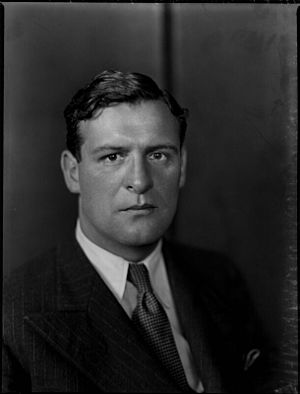Kenneth Lindsay facts for kids
Quick facts for kids
Kenneth Lindsay
|
|
|---|---|
 |
|
| Parliamentary Secretary to the Board of Education | |
| In office 1937–1940 |
|
| Preceded by | Geoffrey Shakespeare |
| Succeeded by | James Chuter Ede |
| Member of Parliament for Combined English Universities with Eleanor Rathbone 1945–1946 Henry Strauss 1946–1950 |
|
| In office 5 July 1945 – 23 February 1950 |
|
| Preceded by | Eleanor Rathbone and Edmund Harvey |
| Succeeded by | Constituency abolished |
| Member of Parliament for Kilmarnock |
|
| In office 2 November 1933 – 5 July 1945 |
|
| Preceded by | Craigie Aitchison |
| Succeeded by | Clarice Shaw |
| Personal details | |
| Born | 16 September 1897 |
| Died | 4 March 1991 (aged 93) |
| Political party | Labour, then National Labour |
Kenneth Martin Lindsay (born September 16, 1897 – died March 4, 1991) was a British politician. He was a member of the Labour Party before joining a different group called National Labour. He was a Member of Parliament (MP) for many years.
Contents
Who Was Kenneth Lindsay?
Kenneth Lindsay was born in 1897 and lived until 1991. He spent much of his life working in politics in the United Kingdom. Being an MP means he was elected by people to represent them in the country's parliament.
He was the very last MP to be chosen using a special voting method called the single transferable vote. This method helps make sure that different groups of people are fairly represented.
Early Political Journey
Before becoming an MP, Kenneth Lindsay tried to get elected several times. He ran as a Labour Party candidate.
- In 1924, he tried to win a seat in Oxford during a special election.
- Later that year, he ran in Harrow during the main general election.
- In 1929, he tried again in Worcester.
Even though he didn't win these first attempts, he kept working in politics.
A Change in Parties
In 1931, the Labour Party faced a big change. The Prime Minister at the time, Ramsay MacDonald, decided to work with the Conservative Party. They formed a new government called the National Government.
Kenneth Lindsay chose to follow Ramsay MacDonald and joined a new group called National Labour. This group was separate from the main Labour Party.
In 1933, an MP named Craigie Aitchison became a judge. This meant his seat in Kilmarnock became empty. Kenneth Lindsay ran in the special election for this seat. He won against the Labour candidate. He was easily re-elected in the 1935 general election and kept this seat until 1945.
Important Government Roles
Kenneth Lindsay held important jobs in the government. These roles meant he helped manage different parts of the country.
- From 1935 to 1937, he was the Civil Lord of the Admiralty. This role involved helping to manage the Royal Navy.
- From 1937 to 1940, he was the Parliamentary Secretary to the Board of Education. In this job, he helped with decisions about education across the country.
Representing Universities
In the 1945 general election, Kenneth Lindsay did not run for the Kilmarnock seat again. Instead, he was elected as an independent MP for the Combined English Universities.
This was a special type of voting area where university graduates could elect their own representatives. He held this seat until 1950. In 1950, these special university voting areas were removed, so he could no longer represent them.
 | Precious Adams |
 | Lauren Anderson |
 | Janet Collins |

